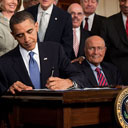
The American welfare state is widely regarded as a poor cousin to those of its democratic peers. As the most unequal wealthy country, the United States also does the least to address that inequality through public policy—despite strong historical and international evidence that social spending programs can drastically reduce inequality.

American inequality is driven not just by the uneven distribution of wages, but also by the uneven distribution of job-based benefits. More than any other country, the United States relies on private employment and private bargaining to deliver basic social benefits—including health coverage, retirement security, and paid leave. The results—on any basic measure of economic security—have been dismal.

Labor standards are a key buffer against inequality, setting both an economic and ethical floor. But, on both scores, the current minimum wage offers a pretty shaky floor. Its value—in historical and international terms—is meager; its coverage is uneven; and it is poorly enforced. How did we get here?

Under the New Deal order, unions not only sustained prosperity but ensured that it was shared. Since the 1970s, however, the attack on unions has reversed these gains. Today, both union membership and inequality stand roughly at 1920s levels.

Inequality is greater now than it has been at any time in the last century, and the gaps in wages, income, and wealth are wider in the United States than in any other democratic and developed economy. Yet we lack a clear and compelling account of how and why we arrived this point. Our current economic troubles have aimed a spotlight at our inequality problem, but they did not create it. What did?
The work of Thomas Piketty and Emmanuel Saez on the evolution of top income shares has yielded a lasting and iconic image of American inequality: a long historical curve that starts high in the early years of the twentieth century …
The American system of unemployment insurance is a remnant of Jim Crow. While national in its reach, the program’s administrative details are left to the states, a bargain struck in the 1930s as the price for Southern support for New …
For the first time in a long time, the jobs report offered mostly good news. The last month saw decent job growth (just over 200,000, alongside an upward revision to the October numbers), and not just in low-wage sectors. An …
The past couple of weeks have offered glimmers of hope on the minimum wage front. Successful ballot measures in New Jersey and SeaTac, Washington (the Seattle suburb surrounding the airport) marked the latest efforts of state and local governments to …
The congressional tantrum over Obamacare ended—as most such outbursts do—with lingering sniffles of discontent, general weariness, and stern recriminations. But it also ended, somewhat surprisingly, with most of the adults in the room talking quietly about a grand budgetary bargain …
Lost in the political theatrics of the shutdown and its resolution lies a simple and uncomfortable truth: if congressional Republicans failed miserably in their gambit to defund the Affordable Care Act or put Social Security on the chopping block, they …

The Affordable Care Act is better than nothing and it has already had a real impact. But it is a timid law that will likely show timid results in the long run. Real health care reform will require lawmakers to confront the problems that the ACA studiously avoided.
Last Thursday, the Census Bureau released the American Community Survey (ACS) estimates of poverty and income. Based on a much larger survey sample than the older Current Population Survey (the CPS numbers were released at the beginning of last week), …
Today the Census Bureau released its 2012 estimates—based on the annual Current Population Survey (CPS)—for income, poverty, and health insurance coverage in the United States. The finer-grained numbers (based on a much larger sample) from the American Community Survey will …
The August jobs report was unremarkable, both for the middling numbers (169,000 new jobs in August and downward revisions to the June and July reports) and for the continuation of a couple of troubling trends. Unemployment ticked down a notch (to …












